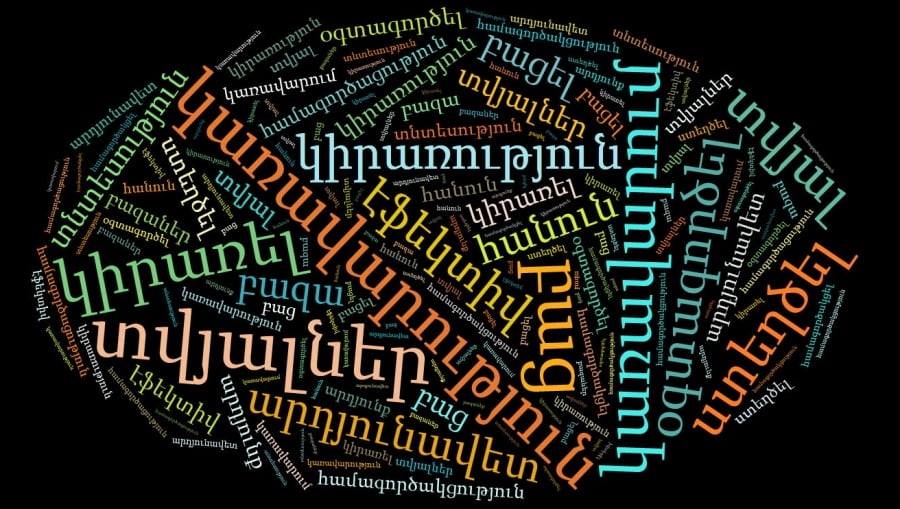Electricity consumption data is much anticipated in Armenia during the winter months. Using the open data from Electric Networks of Armenia (ENA) CJSC, hosanq.info website provides data on energy consumption and cost dynamics.
Any customer of ENA can see their history of electricity consumption and cost, compare that data to that of a few months or a year back, and analyze it.
Currently, the website provides data for the last 13 months. A team member of hosanq.info, Aleksey Chalabyan, says that ideally, they would like to have data for the past two years, which will allow people to compare year-to-year data.
“We selected this data because, despite being quite simple, that is what the public is interested in knowing. We have tried to present boring numbers visually and also show customers how to optimize energy consumption and save money,” says Chalabyan.

During the hackathon, 60 programmers and other professionals used government data to generate innovative solutions to a range of challenges. Hosanq.info was one of the winning projects at the Open Data Hackathon, which took place on December 3-4, 2016. Open Data Hackathon was organized by Kolba Innovations Lab as part of the #Inno4dev: Innovation for Development project, funded by the European Union.
According to the Head of Kolba Innovations Lab, Marina Mkhitaryan, seemingly limitless data is collected in Armenia, and if you study it, you find that some governmental websites have information that can be very useful to citizens, NGOs, and journalists. “This data is inaccessible unless you are a sociologist or a data specialist,” says the Head of Kolba Innovations Lab. That is the reason behind the Open Data Hackathon.
The participants had access to three datasets: healthcare data, hazard and risk maps provided by the Ministry of Emergency Situations of RA, and information available publicly on datalex.am.
The Harkatu.am platform was another winning project at the hackathon. The platform provides data visualization for top taxpayers, based on the datasets from taxservice.am website.

According to team member Anna Hovakimyan, their project visualizes data for top taxpayers based on organization type, geography, field, the amount of taxes paid from 2009, and comparing that data against previous periods.
“Our hope is that with harkatu.am, people will be able to conduct research on Armenia’s economy or other specific sectors more easily. During the hackathon, we already saw some interest in the platform.” One of the difficulties of the project, according to Hovakimyan, was access to data. The team used several sources. They collected, analyzed and combined the data in order to provide accurate and quality data.
The third winning platform, which should be available in a few weeks, was created by the GeoVizData team. The project will visualize datasets from healthcare and risk maps. According to team member Arthur Dolmajian, they tried to add a geographic component to otherwise inaccessible healthcare data. “As a result, with the help of the map, you can see how many people sought medical treatment, what diseases were diagnosed, and with a more in-depth study, find out what caused those diseases.”
Arthur commented that it was not easy to work with healthcare data, because there were many mistakes in the database and the data was presented in different formats.
“Honestly, I believe there is no open data in Armenia. This data is seemingly collected for one day, “ says Arthur Dolmajian.
These projects will receive consulting assistance and finance by Kolba Lab for the next 3-4 months until they become sustainable. It is not clear yet as to how these platforms will function in the future.
“You never know what these projects will bring. Last year we created a map with locations accessible for the disabled and received overwhelmingly positive feedback. You never know what kind of impact it can make. A small contribution can have a ripple effect,” says Marina Mkhitaryan.
According to a media expert Samvel Martirosyan, the future success of similar projects depends on how well the team members will work together in the future. “In my experience, the teams are usually small,” says Martirosyan.
Through the Kolba Lab’s Innovation for Development project, Samvel Martirosyan has implemented a mapping of governmental open data sets in Armenia. According to Martirosyan, the project was aimed to find out what types of governmental open data sets exist, as well as how that information was best used.
Martirosyan believes that, today, the use and the application of open data in public life is a fast growing industry in the world. “Unfortunately, most of the open data in Armenia is stored somewhere collecting dust,” says Martirosyan.
Kolba Lab will continue working with open data. They plan to organize another hackathon by the end of the year, this time focusing on emergency situations.
Anahit Danielyan







